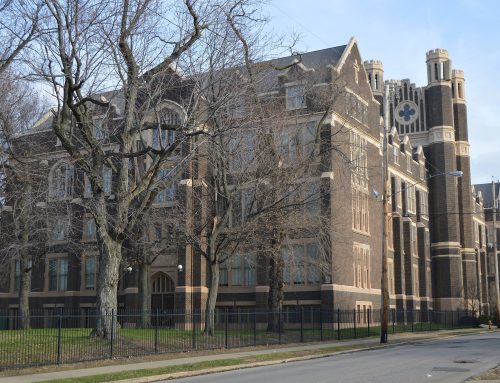By Jess Hardin
Excerpted from Car Bombs to Cookie Tables: The Youngstown Anthology 2nd Edition (Belt Publishing, 2020).
When Youngstown made national news in 2019 for the closure of General Motors Lordstown, coastal journalists tried to capture this special town.
They didn’t write about the new guard trying to revitalize the B&O station downtown or the stretch of shops that popped up on Elm Street. No one talked to the Jamaican immigrant investing in homes on the south side for his friends and family. In one profile, only white patrons of Yankee Kitchen in Vienna were interviewed. Youngstown was painted as a broken place filled with bitter white people who took a gamble on the politics of exclusion to salve their economic angst. Absent were the perspectives of people of color or the LGBT community or the young business owners who took the risk of trying to inject vibrancy into this struggling place.
Had I been consulted, I would have taken the journalists to a drag show at Switch. I would have introduced them to Miss Gay Ohio 1999. We could have taken selfies in front of Switch’s twinkle-lit Pride display.
I bring everyone to Switch, and each time I bring new visitors, they marvel at the sheer existence of the place. They love its whimsical homemade decorations and expansive dance floor and trays of vodka-soaked gummy bears.
One of the first people I met in college made Youngstown a stop on their cross-country road trip from Washington, D.C. to Los Angeles. I brought them to Switch on the Friday night of Pride weekend. We danced in front of the DJ booth before the floor had filled, unabashedly photographing each other. As the night wore on, about a hundred people filled the space, making room for each other. Among fat and thin bodies, white and brown bodies, we cheered for performers, practiced and amateur.
My queer friends and I have visited gay bars and queer spaces from New York to Seattle. Most were welcoming — to fit, cisgender, gay white men. Switch is different. It attracts gay men and lesbians, black folks and white folks, trans folks, cis folks, non-binary folks, people who lost friends to the AIDS crisis and those who were too young to remember it.
And that’s a reflection of the manager, Wes Stevens. He opened Switch in 2018 after running a gay bar in Warren that had recently been sold. Despite his attempts to leave the town he grew up in and came out to, he continued to respond to the Youngstown queer community’s need for a home. The community he built followed him from Warren to Youngstown.
On an early weekday evening in the summer of 2019, I asked Wes why he stays. He told me his coming out story as he transformed a haul of miscellaneous items into decorations for the weekend’s party.
He recalled being taken to his first gay bar—the Troubadour Lounge on the south side—when he was seventeen. “When I walked into that club for the first time,” Wes said, “There were men dancing with men and women dancing with women. There were drag queens on the stage. It was absolutely blowing my mind.
“For the first time, my shoulders dropped, and they made me feel comfortable from that very first second. The community took me in and gave me a sense of self. And, ever since then, I feel like I owe them for taking such good care of me when I was young.”
Switch was a home I did not expect to find when I moved from Washington, D.C., to the birthplace of my mom and my ninety-six-year-old Catholic grandparents. For me, Youngstown had been the subject of family lore since I was a kid, traveling back and forth on weekends for softball games and dinners at my grandparents’ house. I regretted missing out on what sounded like the city’s golden age. My grandparents’ house on Catherine Street was like a bus station, people always coming and going with at least three generations in the house at any given moment.
I knew which parts of me would thrive here. As a rare twenty-five-year-old with all four grandparents, I would get to spend precious time with my mom’s parents. I would deepen relationships with my aunt, uncle and cousins. I would learn more about my family’s hub—a place people have fled from, returned to, visited, stayed, and cherished. Having made some of the same assumptions as out-of-town journalists, I didn’t expect Youngstown to be a place for me to explore the contours of my queerness.
So, when I decided to move to Youngstown to write for The Vindicator after spending the previous seven years in Washington, D.C., I was prepared to pack up my newly discovered queerness and put it in a box alongside my trove of mementos. I was resigned to the fact that it would live in long-distance friendships and private binges of the L-Word.
After my move, I lived with my family in Liberty for several months. Every day, I drove down Belmont Avenue to The Vindicator office downtown. I passed what looked like a defunct little warehouse, a not-uncommon sight on my commute. Rainbow letters spelled out the word,
“Switch.” I knew that it must be a gay space, but I thought it was probably a relic of a more vibrant downtown.
When I was invited to Switch by a new friend, I had the same reaction as my peers. Having expected Youngstown to contain the open-mindedness of a Sunday morning at Yankee Kitchen in Vienna, I was surprised that the place existed, and thrived.
I brought my younger cousin to Switch for her first drag show. She grew up five minutes away but never knew it existed. We sipped beer at the bar as spray-painted bicycles adorned with rainbow streamers dangled from the ceiling. I described what it was like to come out to my parents and relayed stories of drag shows in Washington, D.C. As I watched her excitedly fan dollar bills at drag queens on stage, I felt overwhelmed with gratitude for this space.
I’ve spent Saturday nights at Switch dressed up as a cowgirl. I’ve eaten walking tacos on the patio in front of a bubbling foam machine. I’ve found moments of home for the parts of me that I didn’t think would fit into my life in Youngstown. I’ve bonded with my cousins over music and conversations about sexuality and gender identity. I came out to people I never expected to share my queerness with.
I let Youngstown surprise me. I think everyone should. ■
*Correction: an earlier version of this essay misidentified Wes Stevens as the owner of Switch. He is the manager.
Jess Hardin is a reporter for The Compass Experiment’s first local news site Mahoning Matters in Youngstown. She grew up in Pittsburgh, but Youngstown has been the home of her mom’s family for four generations. Jess graduated from Georgetown University, where she studied Government and Russian. Upon graduating, she received a Fulbright grant to teach English in Akhaltsikhe, Georgia. After working for the U.S. Office of Special Counsel for two years, Jess moved to Youngstown to report for The Vindicator before it closed in August 2019.
Cover image courtesy Jess Hardin.
Belt Magazine is a 501(c)(3) nonprofit organization. To support more independent writing and journalism made by and for the Rust Belt and greater Midwest, make a donation to Belt Magazine, or become a member starting at just $5 a month.






